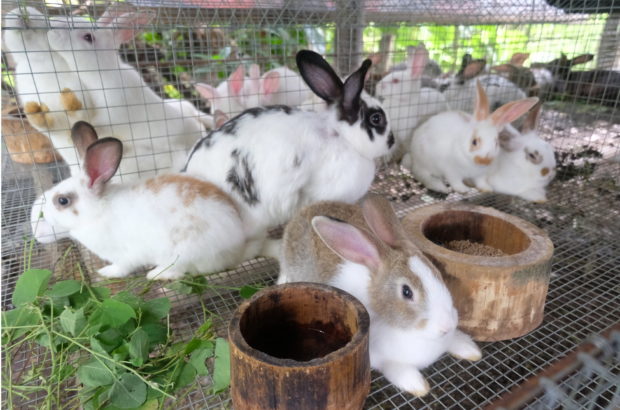Hopping in soon: Rabbit imports

BIG LEAP Rabbit farming gets a boost from new import rules. —BONG SARMIENTO
Adobong rabbit, anyone? Or perhaps baked, roasted, braised or stew?
Rabbits from other countries may now hop around the Philippines following the release on Wednesday of the guidelines on their importation.
The Department of Agriculture (DA) is easing restrictions on rabbit imports to help introduce an alternative to poultry, beef and pork. It is actively campaigning for the consumption of rabbit meat as a substitute source of protein.
Under the DA guidelines, however, rabbits–just like people arriving from abroad–would have to be quarantined for no longer than 60 days to ensure that they would not be bringing in any potential animal disease that could affect the local industry.
The rabbits should also come only from countries without active animal diseases, must be at least 60 days old, and not pregnant. Otherwise, considering how rabbits multiply in very short periods, their numbers after that long confinement could easily double.
Article continues after this advertisementRieldrin Morales, director of the Bureau of Animal Industry, said the purpose of the memorandum circular was primarily to avoid the entry of transboundary animal disease in the country.
Article continues after this advertisementSome local breeders usually import from Indonesia, but without formal guidelines to follow.
Niche market
Eating rabbit meat is still considered taboo in the Philippines, as most Filipinos, especially those residing in the metropolis, like to keep them as household pets.
It may also take some time before Filipinos consider rabbit meat as a delicacy. Just imagine those cute, furry mammals with long ears and fluffy tails.
Art Veneracion, president of the Association of Rabbit Meat Producers Inc. (ARaMP), said in a phone interview that the sale of rabbit meat was indeed a niche market. Currently, rabbit meat is sold mostly in communities where there are breeders who introduce it as an alternative source of meat.
But according to Agriculture Secretary William Dar, who floated the idea of developing the rabbit meat industry, these animals could be cheaper, healthier and required shorter production cycles.
“As much as some people don’t want to hear this, rabbits are farmed and slaughtered all over the world, mostly in European countries, and they are considered as high-value products,” according to AraMP, which has more than 200 members nationwide.
More than being considered as one of the healthiest meats by the World Health Organization (WHO), ARaMP also pointed out that rabbits would not contribute to noise pollution compared with the grunting sound of pigs or the clucking of chickens.
With a minimum capital of P45,000, a breeder can earn as much as P14,000 per cycle or every 70 days. Rabbits are currently being sold between P400 and P450 a kilo, but Veneracion said this could go down to P380.
Veneracion said their group was currently waiting for the DA to also finalize a standard way to slaughter rabbits so that breeders could tap into the hotel and restaurant industry as well.
“There remains a huge potential in the rabbit industry. We are only getting started. If we get proper assistance from the government and people are educated about the health benefits of rabbits, there are several people who can benefit and make money from it,” he added.